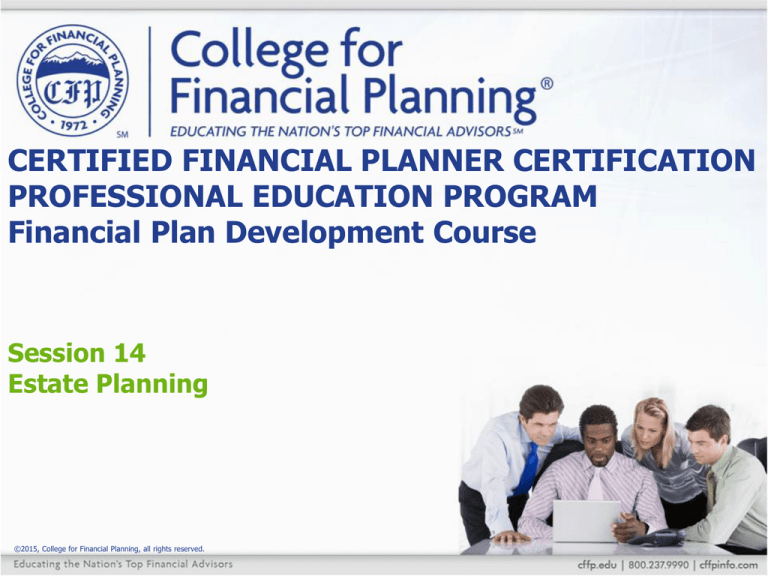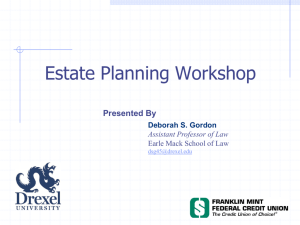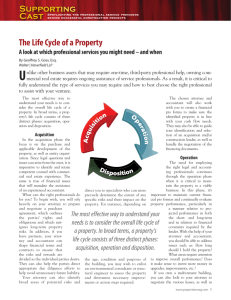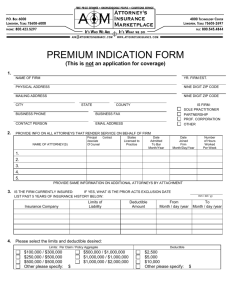
CERTIFIED FINANCIAL PLANNER CERTIFICATION
PROFESSIONAL EDUCATION PROGRAM
Financial Plan Development Course
Session 14
Estate Planning
©2015, College for Financial Planning, all rights reserved.
Start Recording
This class is being
recorded so you may
review it at a future
time.
14-2
Quiz
A non-attorney financial planner cannot discuss a
client’s will with the client because the planner
would be practicing law without a license.
True
False
14-3
Answer: False
A non-attorney financial planner cannot discuss a
client’s will with the client because the planner
would be practicing law without a license.
True
False Mere discussion of a will is not
practicing law. If the planner advised the
client to revoke the will or drafted a new
one, the planner would then be practicing
law without a license.
14-4
Dowlers Summary
You want to leave an estate for the benefit of Matt. Anne’s inheritance
from her parents has helped you to accumulate your current resources.
Jim is an only child and will inherit everything. He is also the executor
and has power of attorney for his parents. Help in having a general
understanding of an executor or power of attorney would be
appreciated. He is concerned about handling that role and not sure
what it entails.
Jim’s parents are currently worth around $3.5 million and their estate is
continuing to grow slightly, but they are concerned about inflation and
potential long-term care and/or medical costs.
You both think you would rather Jim’s
parents’ money go to Matt but do not
want to count on it and aren’t sure
if it is a good idea to do so.
14-5
Dowler continued
You want us to help you prepare for working with an estate
planning attorney by understanding what documents you
should acquire.
The only documents you have are the do-it-yourself wills
you put together shortly before leaving on a vacation just
after Matt was born. Each of your wills state that upon your
death with a surviving spouse, everything goes to the
surviving spouse.
If there is no surviving spouse,
everything goes to Matt. There
were no further dispositions of
property in case Matt had
predeceased you.
14-6
Plan Development Boxes 26, 27, 28, 29, & 30
Why are we having you
look at and write these
issues?
Look for these and
bring them up as we
review materials!
14-7
Legal & Estate Planning
The Basics
• Legal and estate planning helps clients make decisions that match
their values about the accumulation, preservation, and ultimate
distribution of assets.
• It addresses financial security of the family at times of crisis
including incapacity, serious medical situations, travel problems,
and death.
• It efficiently addresses probate,
asset transfers, gifts, estate taxes,
settlement costs, and other
personal end-of-life decisions.
14-8
The Basics
• Only around 40% of U.S. adults have wills
• Clients are resistant to implementing estate planning
•
•
recommendations
Resistance is typically NOT cost of legal advice but the
resolution and addressing of issues between family
members (disagreement on guardians,
charities, distribution timing, etc.)
Myth that it is only for the
wealthy
14-9
Planner’s Role
Help client understand consequences
of not addressing legal and estate
planning issues (emotional, practical,
and financial).
Identify potential weaknesses in existing
plan that would result in:
• Unintended consequences
(disinheriting child from prior
marriage because of beneficiary
designations or leaving an 18-yearold with $2 million outright)
• Increased settlement costs and tax
liabilities
• Loss of privacy
• Actions contrary to wishes (life
support, unwanted guardian, etc.)
14-10
Planner’s Role
• Avoid practicing law
• Help client understand and
•
•
prepare information to take to
an estate planning attorney,
including possible strategies
to discuss with the attorney
Monitor implementation
Make sure that your actions
and strategies match
documents and intentions of
estate plan (i.e., titling of
assets, which assets to use
first or gift for charity vs.
retain in the estate)
14-11
Planner’s Role: Collect & Review
X
Inventory of special property—
jewelry, fine art, collections
X
X
Account statements (titling)
Living wills or advanced medical
directive
X
X
Any arrangements for
funeral/burial/cremation/etc.
Names, addresses, birthdates of ALL
anticipated beneficiaries
X
X
X
X
Divorce decrees
Information on charities including tax
ID# and type of charity
X
Location of safety deposit box,
inventory, and who has keys and
access, important web sites and
passwords
X
X
X
X
Wills
X
Revocable and irrevocable trusts
Letters of last instruction
Personal property addendums
Medical, financial, or legal powers of
attorney
Life insurance contracts
Beneficiary designations
Titles/deeds to property, especially
out of state or country
By asking and reviewing, you will
know how prepared the clients are
and can consolidate results for their
attorney visit.
Business agreements
Family debts or agreements/cosigned
loans/student loans, financial
promises to children or grandchildren
What do you have from Dowlers
(i.e., X )
14-12
Basics
Three Issues
1. Complying with client’s final
wishes regarding incapacitation
and other end-of-life decisions
2. Transferring assets according to
their wishes and cost effectively
3. Providing for survivors or other
financial and charitable goals
along with needed estate
liquidity
Avoiding estate taxes is not a
goal. It comes from
accomplishing the client’s goals
efficiently!
14-13
End of Life: Living Will
•
Establishes client wishes
regarding life-sustaining or lifeprolonging treatment in
terminally ill situations
•
Defines use of cardiopulmonary
resuscitation (CPR), intravenous
therapy for nutrition or
medication, feeding tubes, and
ventilators for artificial breathing
•
Some states known as
declaration or directive to
physicians and health care
professionals or as advance
medical directive
•
Flash drives & refrigerator
postings for paramedics
What does Jim need to know to
serve for his parents? What
documents are needed?
14-14
Incapacitation and End of Life: Medical Power of Attorney
(aka) Durable power of attorney for
health care
•
Appointing another person to make health
care decisions when client is unable to due
to physical or mental incapacitation
•
Durable makes it remain in effect unless
revoked or put in effect under certain
conditions (springing power) such as
mental incompetence
•
Agent can make decisions for non-terminal
situations or ensure compliance with living
will
•
Does not obligate agent with financial
responsibility (can be sued, however, for
fiduciary duty lapses)
•
Contingent or successor should be
appointed; can give power to more than
one but important to set final say in case of
disagreement
What does Jim need to know to
serve for his parents? What
documents are needed?
14-15
Incapacitation/Travel/Ease: Financial Power of Attorney
•
Appoints individual or organization to handle client’s affairs
when unavailable or unable due to physical or mental
incapacity.
• May be general with broad powers for all financial affairs or
limited to specific list of responsibilities.
• May or may not allow gifting of assets, acting on trust
powers, etc.
• Courts universally recognize powers of attorney but Social
Security Administration does not.
• Many institutions will require additional paperwork and/or
RECENT power of attorney.
What does Jim need to know to serve for his parents?
What documents are needed?
14-16
Medical: HIPAA Authorization
•
Without this authorization, designated
agents may not be allowed access to
information to make necessary decisions.
•
HIPAA authorization (Health Insurance
Portability and Accountability Act of 1996)
allows clients to identify individuals
authorized to access private client
information – including immediate family,
friends, or those named in end-of-life
documents or powers of attorney.
•
State law rules so witness or attorney may
be required. Also different versions based
on state if snowbirds.
What does Jim need to know to serve for
his parents? What documents are
needed?
14-17
Wills
•
Everyone who owns any property
needs one
•
•
•
Disposes of decedent’s property
•
Have capacity (age, mental capacity,
nature of document being signed)
•
•
•
Specific, general, or residual legacy
•
•
Disinheriting must be clearly indicated
Names executor and guardian
Must be signed (typically two
witnesses required)
Spousal right to elect against the will
Prenuptial can void right to elect
against the will
If no will, state has one for you
What does Jim need to know to
serve for his parents? What
documents are needed?
14-18
Will Substitutes
• Contracts
o Use of beneficiary designations
•
•
•
•
Life insurance
Annuities
Retirement plans
POD accounts, etc.
• Deeds conveying property as JTWROS, tenancy
by entirety, and some community property
states
What will substitutes do you need to
review? What do they have that will pass
this way?
14-19
Which assets pass outside the will?
How much does the
will control and how
much passes by
beneficiary or title?
Which documents may
need to have
beneficiary
designations changed
if trusts are created?
14-20
Will Substitutes
•
•
•
Trusts (revocable & irrevocable)
Revocable (living trusts)
o Avoids probate
o Does not avoid taxation
o Income taxable at grantor’s marginal rate
o If assets are not retitled into trust, it does not accomplish goal
Irrevocable trusts
o Avoids probate
o Can avoid some taxation or create taxation at time of gift
o Owner may retain specific and very limited control
o Flexibility in design: multiple purposes, multiple beneficiaries,
wide range of options for controlling from the grave within
guidelines
What trusts may be beneficial for Dowlers?
14-21
Order of Death Distribution
If death order is Jim’s
parents, Jim, Matt, then
Anne, how much would
Anne’s sister inherit
now?
If death order is Anne,
Jim’s parents, Matt, then
Jim, how much would
her sister receive?
14-22
The Dudellas
Client summary on Legal Documents & Estate Planning
•
You recognize that your wills, which were created 15 years ago, are out of date and
would like to understand what types of documents and estate issues you need to
address.
Recommendation:
•
Your current documents are outdated and no longer appropriate or viable.
Documents that you need include:
o
o
o
o
o
o
HIPAA authorizations for all three of you, allowing family members to get
medical information where appropriate
Medical powers of attorney for all three of you
Financial powers of attorney for all three of you
Living wills for all three of you
Wills (at least you and Nancy); due to Autumn’s age,
you may want to incorporate a testamentary trust
that would provide guidance and management of
funds until she is at an age where she can
effectively manage the resources
Create personal property memorandum
14-23
Understanding Distribution
David and Nancy have wills that are 15 years old. They
leave everything to each other and then to Autumn. If
Autumn and David predecease Nancy, her assets pass to
her nieces. If Autumn and Nancy predecease David, the
assets pass to his brother.
After our discussion, they realize the importance
of leaving each of their heirs something
to avoid hurt feelings caused by assets
and family heirlooms going to just one
family or the other.
It’s important to map out estate for
different death orders to see the
consequences.
14-24
Supporting the Dudellas
Steps to assist them:
•
Give them a document to complete with each
other in advance of seeing the attorney
• Includes names, addresses, types of
beneficiaries
• Includes names, addresses, roles of various
representatives
• Clearly define each person’s desires and where
they conflict
• List of areas that they have fears or need
guidance
•
Provide summary of assets, liabilities, insurance
contracts, ownership, and beneficiaries for the
attorney
•
Review documents and clients’ understanding of
documents prior to signing
•
Review to-do list for changing beneficiaries,
ownership, and communication to representatives
and family about the documents
14-25
Dudellas
Recommended testamentary trust to:
•
Keep assets in a trust with
income to spouse and Autumn
with professional management
for Autumn until she reaches
certain age to be determined
•
Provide for correct distribution of
assets in case of different order
of deaths
•
Simplify beneficiary language
creation for will substitutes
(attorney will provide beneficiary
language)
•
Provide some protection from
the feared future – new wives or
husbands, divorces, creditors,
some scams, etc.
14-26
Next Class
Prior to next class
Economic, Political and
Regulatory Impacts
Creating your Executive
Summary and
the scoring guide
Read Chapter 8
Complete Plan
Development box #31
Read Chapter 9: Creating
Your Executive Summary
Review Appendix A and
Scoring Guide for
Executive summary
14-27
CERTIFIED FINANCIAL PLANNER CERTIFICATION
PROFESSIONAL EDUCATION PROGRAM
Session 14
End of Slides
©2015, College for Financial Planning, all rights reserved.




